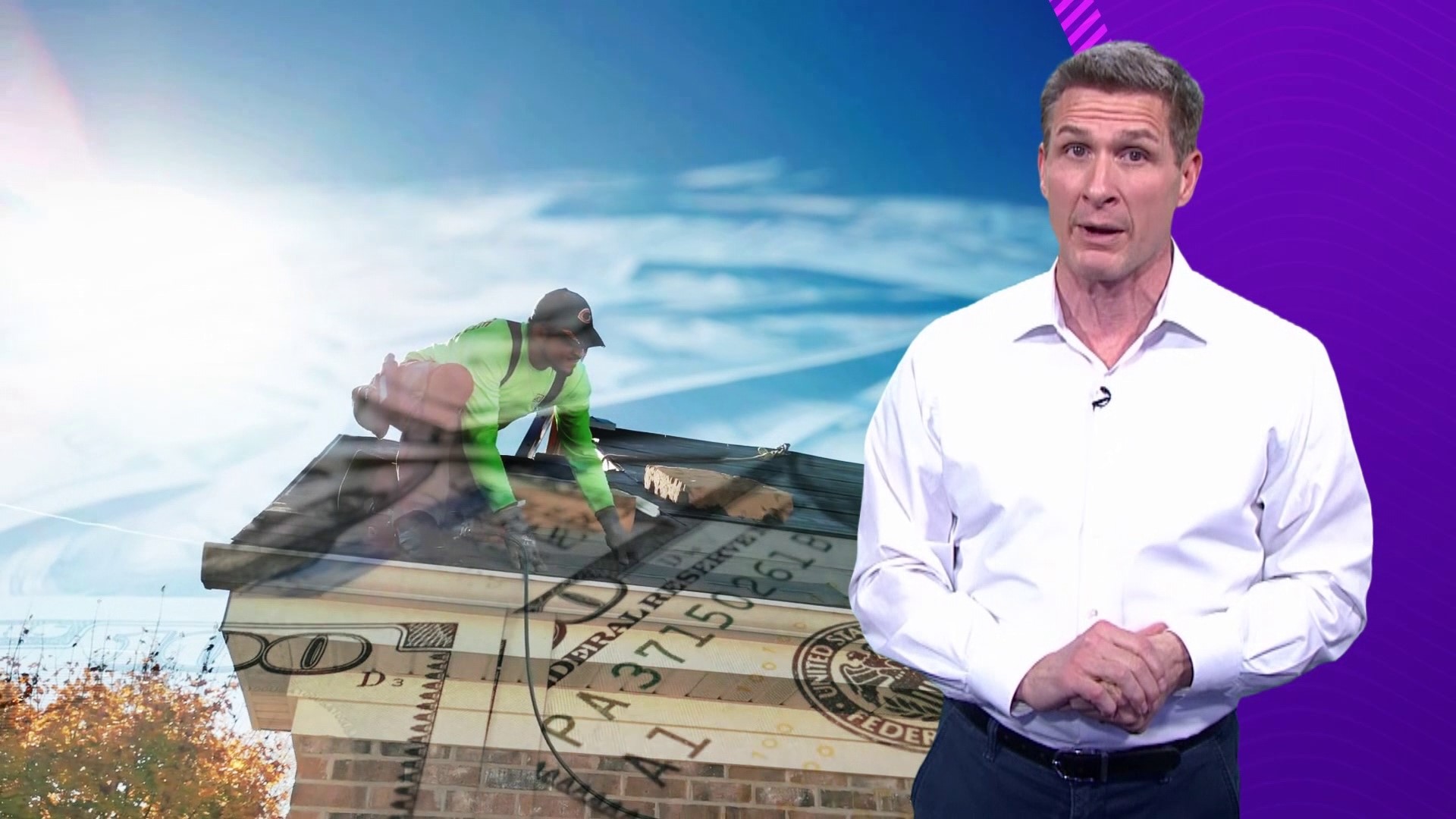DALLAS — Without realizing it, I have been taking a slow, long-term financial beating.
Like so many other Texans, I had to have my roof replaced last year after it was beaten up by hail. I paid my deductible and then felt very thankful that I had chosen total replacement cost coverage -– not actual cash value. Here is an important explanation of the difference between the two.
Basically, that type of coverage meant that after I paid my deductible, the rest of the expense for that very expensive roof replacement was paid by my homeowner’s insurance. So, I was very thankful for that, too.
And that is where the thanks came to an end. I say that because also like many other Texans, my homeowner’s insurance has been going up and up. Recently, I wondered why some of that increase didn’t seem to be significantly mitigated by my brand-new roof, because compared to an older roof, it has less of a risk of failing.
An important talk with my insurer
I chatted about it with my insurer– by text. I love that format because it preserves our conversation in writing. I asked them when their records indicated my roof was replaced.
The correct answer is 2023. The partial credit answer would have been about a decade and a half before, when it was previously replaced. The absolutely incorrect and impossible response would be 1992. They answered: 1992. I don’t know where they got that. And neither did they.
Recalculate my premium!
Regardless, I demanded a recalculation of my premium. I also asked for a retroactive look at how much my insurer might owe me for their long-term mistakes on one of the primary cost drivers for homeowner’s insurance.
Then they responded that they would update the roof age, but they suggested the age of my roof wouldn’t have any impact on my premium going forward or retroactively. I was incredulous.
Again, the roof is one of the more expensive insured components of a house, and it affects (and hopefully protects) a lot of other insured components of a house. A simple Google search makes it obvious that, in fact, the roof’s age matters a lot when determining an insurer’s risk, and therefore an insured’s premium. I found this article…and this one…and this one…and one that even showed estimates that a new roof reduces annual homeowner premiums by hundreds of dollars.
But wait...there's more...
It wasn’t just the internet. I have been told by insurers that roof age matters. It’s why they ask the age when you request a quote.
Importantly, even the Texas Department of Insurance, which regulates the insurance industry in this state, lists the cost inputs for calculating premiums. And of all the components TDI could list, it only includes a handful of considerations. And one of those is…you guessed it: “Your home’s roof age and material”.
On top of all that, I even immediately found an article published by my own insurer that said a new roof could “lower your premium” and that roof age is one of the “biggest risk factors” for a home.
I escalated my conversation with my insurer and was told by the next person that indeed my roof’s age matters and that my rate would be adjusted. At the time of this writing, I am still not satisfied with the amount of the adjustment and I am arguing for more retroactive relief. I am asking the insurance company to show me, in writing, how they have calculated the amount of the adjustment.
If your roof has been replaced in recent years, check on this
If your roof has been replaced in recent years -– and a lot of them have in Texas -– you might want to check the insurance company’s records regarding your roof's age. If their answers are incorrect or are nonsensical, go up the hierarchy and demand specifics.
If you face this kind of situation and you can’t get resolution with your insurer, you may be able to press them by reporting certain issues to the Texas Department of Insurance here.
Texas is the hail capital
While we are on the subject of roof replacements, my roof and many others in Texas have been switched out in recent years because of hail. We have had a lot of it. We’re No. 1 (yet again) in major hail events according to the Insurance Information Institute.
We have gotten that horrible award every year since 2013 except for one year when the ice stone trophy went to Nebraska. But in 2023, the III found that it wasn’t even close. They noted that Texas had 1,123 major hail events in 2023 out of the 6,962 in all the U.S. 1,123 is far more than the #1 placeholder in at least the past decade.
Also, the state in the No. 2 spot, Nebraska, was listed as having 486 major hail events last year. The difference between those top two spots was also abnormally large compared to previous years.
The good news about hail is this: Your insurance company cannot increase your premium based on claims for damage from natural causes, including weather-related damage. And more good news: Your insurance company cannot refuse to renew your policy based on claims for damage from natural causes, including weather-related damage.
Those are word-for-word excerpts from Nos. 18 and 19 in the insurance Consumer Bill of Rights in Texas. I have previously expounded on the things that can and cannot make your homeowner’s insurance premium rise.
On the other hand, when it comes to automobile insurance claims, that caveat does not apply. Even claims for naturally caused auto damage can make your rates rise. That is why when damaging storms are forecasted, you might see your neighbors driving around looking for cover or squeezing their vehicles into a packed garage.

